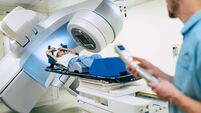Cancer patients still coming to hospital 'too late' due to pandemic, research finds

Professor Roisin Connolly expects patients will benefit from these closer links between UCC and Cork University Hospital.
Cancer doctors are still seeing patients coming to hospital at a later stage in their illness than was usual before the pandemic, a leading oncologist has warned.
However, it is expected changes in data collection and research will help to monitor this and benefit patients, said Professor Roisin Connolly, academic director at the Cork University Hospital/University College Cork cancer centre.













